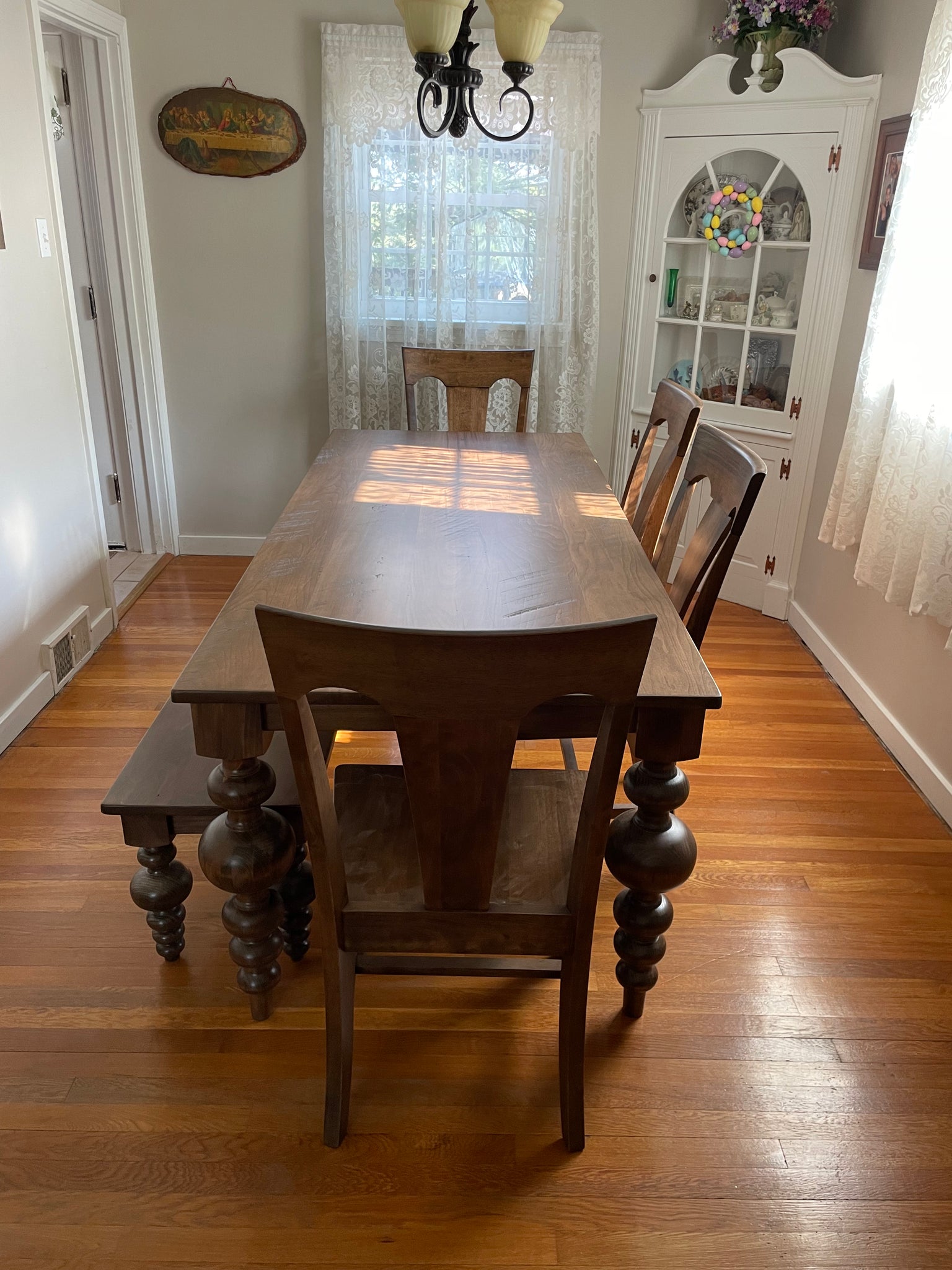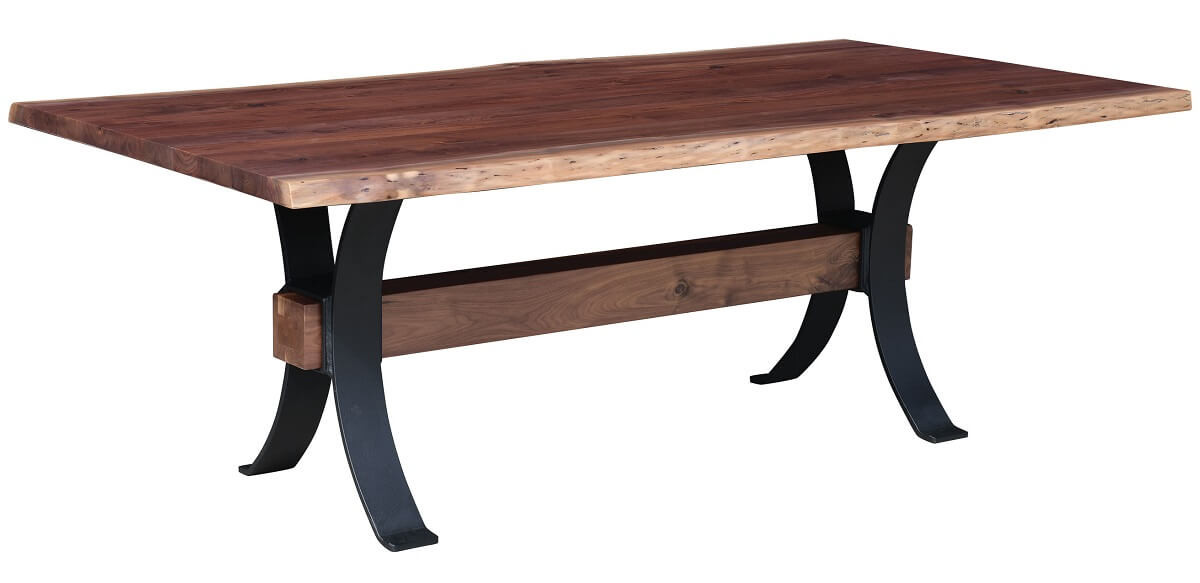Why Custom Dining Room Table Legs Are Worth the Investment
Why Custom Dining Room Table Legs Are Worth the Investment
Blog Article
Exactly How to Choose the Perfect Dining-room Table Legs for Your Home Design
Selecting the optimal eating area table legs is a nuanced process that requires careful consideration of various elements, including your space restrictions, visual choices, and sensible requirements. The interaction in between measurements, products, and designs can significantly influence the setting of your dining area, making it crucial to approach this decision systematically.
Assess Your Dining Space
Analyzing your dining room is crucial for selecting the right table legs that enhance both aesthetics and functionality. Begin by determining the dimensions of your dining area, including ceiling height, floor room, and distance to other furniture. This details will certainly aid figure out the ideal size and elevation of your eating table, which straight influences the choice of table legs.
Following, consider the design and design of your eating room. For circumstances, an open-concept style may gain from table legs that provide aesthetic lightness, such as slim steel or acrylic alternatives. Conversely, a more typical setup may call for tough wood legs that give a feeling of durability.
Examine the existing shade scheme and materials in your dining area. Harmonizing the table legs with these aspects creates a cohesive look that boosts the general style.
Eventually, a complete evaluation of your eating space will lead you in making an informed decision, guaranteeing that your table legs not just boost the visual appeal but additionally offer sensible objectives.
Consider Your Design Preferences
When choosing dining area table legs, it is necessary to assess your personal style preferences, as they dramatically affect the overall aesthetic of your eating room. Your choice of table legs can either complement or comparison with existing decor, making it critical to align them with your favored interior decoration motif.
If your home leans in the direction of a modern visual, think about smooth metal or minimal wooden legs that provide a tidy, uncluttered appearance. For a much more traditional technique, ornate wood legs with elaborate makings can include a touch of beauty and refinement. Industrial styles take advantage of durable, resources such as reclaimed timber and metal mixes, reflecting a tough charm.
Furthermore, farmhouse and rustic styles commonly favor strong, chunky legs that evoke a feeling of warmth and comfort. On the other hand, if your decor is eclectic, you may pick non-traditional forms or a mix of products to create visual passion.

Evaluate Material Options
The choice of material for dining space table legs plays a crucial duty in both resilience and aesthetic charm. Typical products consist of timber, steel, and composite choices, each offering distinctive features that can affect the total appearance and long life of your table.
Timber is a classic choice, known for its warmth and versatility. Hardwoods like oak and walnut provide remarkable strength and can be finished in various stains to match any decor. However, softwoods like pine are more prone to scrapes and dents, making them less perfect for high-traffic areas.
Metal legs, frequently crafted from steel or aluminum, show modernity and commercial appeal. They are highly durable and immune to put on, making them appropriate for families with youngsters or regular celebrations (dining room table legs). In addition, steel can be completed in various shades, improving the his comment is here customization opportunities
Composite products, such as MDF visit this site or laminate, offer price and diverse designs. While commonly much less resilient than strong wood or steel, they can still supply a trendy look and are typically very easy to preserve.
Inevitably, the product you choose must align with your way of living, aesthetic choices, and the level of usage your table will certainly experience.
Determine Height and Dimension
Selecting the proper height and dimension for your dining-room table is essential for both performance and comfort. The common height for dining tables typically ranges from 28 to 30 inches, permitting sufficient legroom for a lot of individuals when seated. It is essential to consider the dimensions of your eating room and the types of chairs you prepare to make use of.

Additionally, think about the proportions of your dining space. A larger table in a large location can produce a grand atmosphere, while a smaller sized table functions well in more intimate settings. Eventually, the best height and size will harmonize with your overall decor and enhance the eating experience for you and your visitors.
Explore Modification Opportunities

Furthermore, the layout of the legs can be customized to fit numerous styles, such as rustic, modern, or commercial. Tapered legs can stimulate a mid-century modern feeling, while chunky, block-style legs might resonate with typical or farmhouse design.
Homeowners can additionally explore shade finishes, from all-natural wood spots to paint, allowing them to match or comparison with the tabletop and bordering design.
In addition, leg height can be gotten used to accommodate certain seating arrangements or individual choices, improving both convenience and functionality.
Finally, unique embellishments, such as makings or decorative brackets, can better personalize the table legs, making the eating experience not simply a meal however a declaration item in the home. By considering these personalization alternatives, property owners can produce a dining-room table that absolutely reflects their originality.
Conclusion
Selecting the suitable dining-room table legs needs cautious factor to consider of numerous factors, including the dimensions of the eating room, design choices, material resilience, and preferred elevation. Modification alternatives further enhance the ability to accomplish a cohesive aesthetic that matches the general decoration. By methodically reviewing these components, home owners can ensure that the chosen table legs not only fulfill functional requirements but also contribute favorably to the eating experience and setting of the home.
Picking the excellent eating area table legs is a nuanced procedure that needs cautious consideration of different elements, including your space constraints, visual choices, and functional needs.Examining your eating room is crucial for selecting the right table legs that complement both aesthetic appeals and performance.When identifying dimension, determine the location where the table will be put to guarantee it fits pleasantly, allowing for at least 36 inches of clearance around the table for simple movement. A larger table in a large area can produce a grand atmosphere, while a smaller table works well in even more intimate setups.Selecting the ideal eating area table legs calls for cautious consideration of numerous variables, consisting of the dimensions of the dining space, design choices, product resilience, and desired elevation.
Report this page